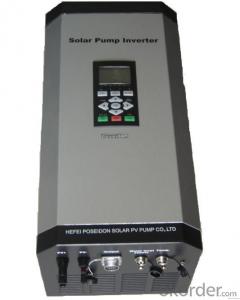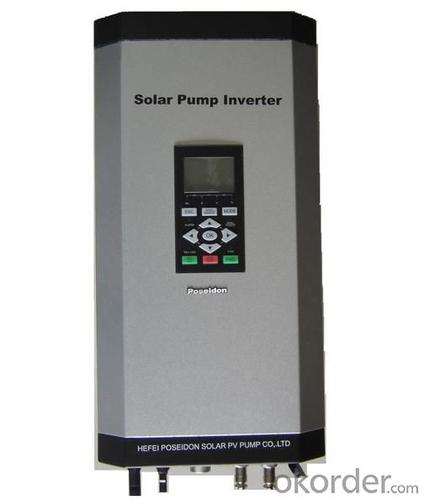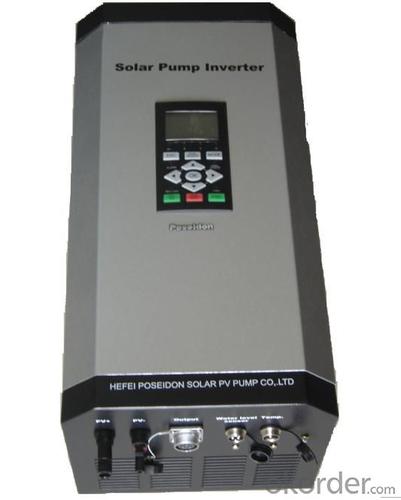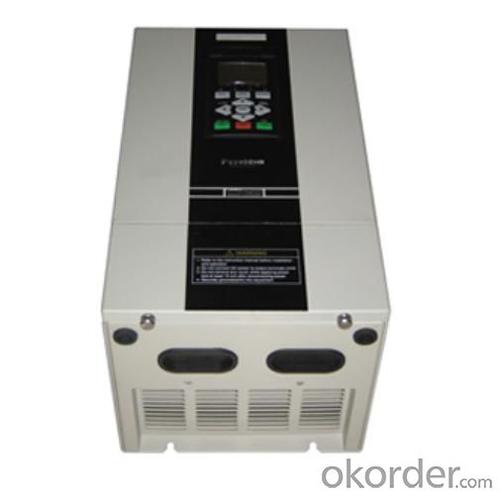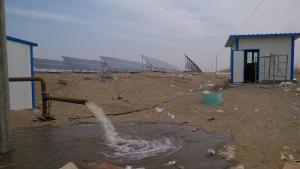Garden Pond Solar Pump FCPM9KH Inverter
- Loading Port:
- China Main Port
- Payment Terms:
- TT OR LC
- Min Order Qty:
- -
- Supply Capability:
- -
OKorder Service Pledge
Quality Product, Order Online Tracking, Timely Delivery
OKorder Financial Service
Credit Rating, Credit Services, Credit Purchasing
You Might Also Like
Solar pump inverter FCPM9KH Product Description:
Product Description:
Solar water pumping system is constructed with solar panel array,solar pump inverter and AC water pump, DC current produced from solar panel will be delivered to solar pump inverter,and it will convert it into AC current to drive water pump,and will automatically regulate output frequency according to sun radiance intensity,maximally realize MPPT tracking function.
Product Features
Adopting the proposed dynamic VI maximum power point tracking (MPPT) control method, with fast response, and reliable operation, achieves efficiency of 99%.
Designed with variable frequency driver, greatly improves efficiency
Extremely high efficiency
Digital mode control, with automatic operation and manual operation mode options
Complete protection functions
Adopts intelligent IPM module, with high reliability
LCD display and operation panel, in real time presents operating data
Optional for water level measurement and control circuit
Applicable for general ACC pumps, like centrifugal pump, piston pump etc.
Independent intellectual property; Highly effective, the redundant reliability, exempts the maintenance and the long life.
The pumps are soft started, fully protected.
No batteries are used. So better Sunlight, more water
Datasheet.
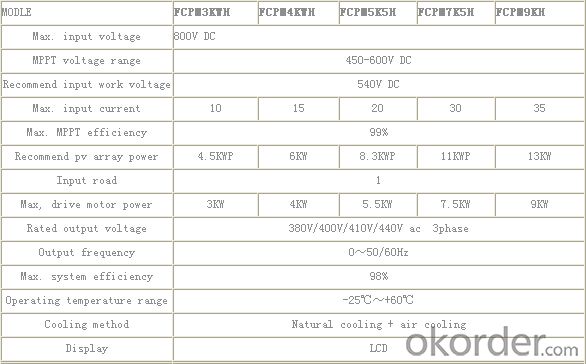
- Q: How does a solar pump handle water with high levels of acidity?
- A solar pump is not specifically designed to handle water with high levels of acidity. However, if the water acidity is not excessively high, the pump may still function adequately. In cases where the acidity levels are too high, it is recommended to use alternative pump systems that are specifically designed to handle corrosive or acidic water.
- Q: Can solar pumps be integrated with existing water filtration systems?
- Yes, solar pumps can be integrated with existing water filtration systems. By utilizing solar energy to power the pumps, it becomes possible to maintain a sustainable and cost-effective water filtration process. The solar pumps can provide the necessary pressure and flow rate to ensure efficient filtration, resulting in clean and safe drinking water.
- Q: Can a solar pump be used in areas with limited access to reliable internet or communication networks for monitoring?
- Yes, a solar pump can be used in areas with limited access to reliable internet or communication networks for monitoring. Solar pumps are designed to operate independently of internet or communication networks. They typically rely on solar energy and do not require constant monitoring or connectivity for their basic functioning. However, in such areas, monitoring and maintenance tasks may need to be carried out manually or through alternative means, such as periodic site visits or using local communication systems like radio or satellite networks.
- Q: Are solar pumps more cost-effective than traditional pumps?
- Yes, solar pumps are generally more cost-effective than traditional pumps. Solar pumps use renewable energy from the sun, which is free and abundant, eliminating the need for expensive fossil fuels or electricity. Additionally, solar pumps have lower operating and maintenance costs compared to traditional pumps, making them a more economical choice in the long run.
- Q: Can a solar pump be used for water supply in vineyards?
- Yes, a solar pump can be used for water supply in vineyards. Solar pumps are a sustainable and efficient option that can harness energy from the sun to power the pump and provide water for irrigation in vineyards. This reduces the reliance on electricity or fuel-powered pumps, making it a cost-effective and environmentally friendly solution.
- Q: Can a solar pump be used for water supply in remote research stations?
- Yes, a solar pump can be used for water supply in remote research stations. Solar pumps are a sustainable and reliable solution for accessing water in remote areas where grid electricity may not be available. They use solar energy to power the pump, eliminating the need for fuel or electricity, making them environmentally friendly and cost-effective. Additionally, solar pumps can be easily installed and maintained, making them a suitable option for water supply in remote research stations.
- Q: How does a solar pump help in reducing the risk of deforestation?
- A solar pump reduces the risk of deforestation by providing a sustainable and renewable source of energy for pumping water, eliminating the need for relying on traditional fuel sources such as firewood or diesel. This reduces the demand for timber and decreases the pressure on forests for fuelwood, ultimately contributing to the conservation of forests and mitigating deforestation.
- Q: Can a solar pump be used for water circulation in ponds or lakes?
- Yes, a solar pump can be used for water circulation in ponds or lakes. Solar pumps are designed to operate using sunlight, converting it into energy to power the pump. They are often used in outdoor settings, including ponds and lakes, to circulate and aerate the water. This not only helps maintain water quality but also prevents stagnation and promotes a healthier environment for aquatic life.
- Q: Can a solar pump be used for water supply in parks or recreational areas?
- Yes, a solar pump can be used for water supply in parks or recreational areas. Solar pumps are an efficient and sustainable solution for water supply in outdoor spaces. They harness solar energy to power the pump, eliminating the need for electricity and reducing costs. Additionally, solar pumps are environmentally friendly and can provide a reliable water source for various recreational purposes such as irrigation, decorative water features, and drinking water supply.
- Q: Can a solar pump be used in areas with high water demand?
- Yes, a solar pump can be used in areas with high water demand. Solar pumps are designed to be efficient and capable of meeting the water needs of various applications, including agricultural irrigation, livestock watering, and community water supply. By converting sunlight into electricity, solar pumps can provide a reliable and sustainable solution for areas with high water demand, especially when combined with proper storage and distribution systems.
Send your message to us
Garden Pond Solar Pump FCPM9KH Inverter
- Loading Port:
- China Main Port
- Payment Terms:
- TT OR LC
- Min Order Qty:
- -
- Supply Capability:
- -
OKorder Service Pledge
Quality Product, Order Online Tracking, Timely Delivery
OKorder Financial Service
Credit Rating, Credit Services, Credit Purchasing
Similar products
Hot products
Hot Searches
Related keywords

